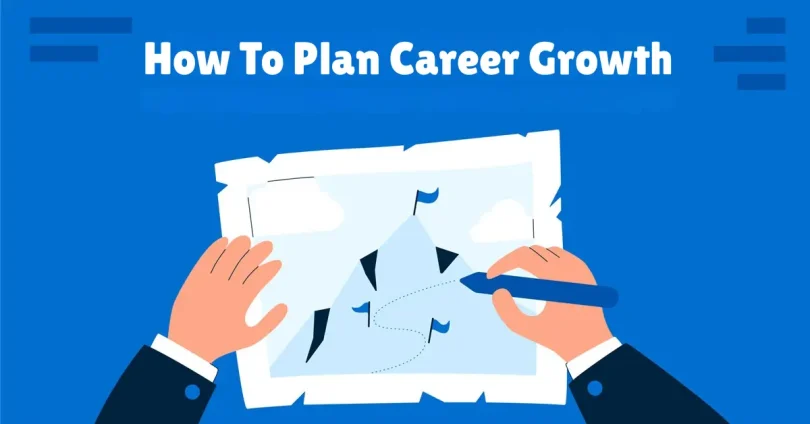Planning career growth is not just for ambitious professionals—it’s for anyone who wants to take control of their future. Whether you’re just starting out, aiming to level up in your current role, or considering a complete career change, understanding how to plan career growth can give you direction, confidence, and clarity.
Think of it as creating a roadmap for your professional journey. Without it, you may wander aimlessly or miss opportunities that could help you reach your full potential.
What Is Career Growth Planning?

A career development plan, also called a professional development plan, is essentially a roadmap for your career. It outlines your career goals and the steps required to reach them. Traditionally, HR or People Operations teams create these plans to help employees recognize growth opportunities within a company.
However, here’s the good news—you don’t have to wait for your employer to create one for you. By taking charge of your own career development plan, you can define your priorities, focus on what truly matters, and ensure that every decision you make aligns with your long-term professional goals. This plan isn’t just a document—it’s a powerful tool that keeps you accountable and proactive in your career journey.
Why Planning Your Career Growth Matters
Before learning how to plan career growth, it’s important to understand why it matters:
- Clarity on Your Goals
A career growth plan helps you visualize where you want to go and what success looks like. Without this clarity, you may drift through roles that don’t truly align with your aspirations. - Better Decision Making
When you know your career path, it becomes easier to identify opportunities that align with your objectives. You can say “yes” to projects, promotions, or skill-building initiatives that move you closer to your goals—and confidently decline those that don’t. - Increased Motivation
Seeing a clear roadmap provides direction and purpose. It motivates you to take actionable steps toward advancement, knowing exactly what needs to be done and why. - Skill Development
Planning allows you to identify gaps in your skills and knowledge. Once you know what’s missing, you can take proactive steps to bridge those gaps, making yourself more valuable in your current role or better prepared for future opportunities.
Steps to Plan Career Growth

Here’s a detailed, step-by-step approach to effectively plan your career growth:
1. Reflect on Your Career Goals
The first step is self-reflection. Ask yourself:
- What do I want to achieve in the next 1, 3, or 5 years?
- Which roles or positions excite me the most?
- What motivates me professionally—money, recognition, impact, or creativity?
Writing down your answers can provide clarity and guide your career decisions. This reflection ensures that your goals are aligned with your values and passions, not just external expectations or societal pressures.
2. Assess Your Current Position
Take an honest look at your current situation:
- What skills, experiences, and achievements do I already have?
- What are my strengths, and where could I improve?
- How do colleagues or supervisors perceive my performance?
Use tools like self-assessment questionnaires, performance reviews, or feedback from mentors to get a clear picture. Understanding your starting point is essential—it allows you to map out a realistic and actionable plan for growth.
You may also like to read this:
Why Learning Strategies Matter For Smarter Learning
10 Top Learning Tips For Exams To Boost Performance
Online Learning Vs Classroom Learning Explained
What Is Career Growth? A Guide To Professional Success
Types of Career Paths: Complete Professional Guide
3. Identify Growth Opportunities
Now it’s time to explore opportunities to develop your career. Growth opportunities can come in many forms:
- Training Programs or Courses: Enhance your technical or soft skills through online courses or professional certifications.
- Networking Events: Attend conferences, workshops, or professional gatherings to expand your connections.
- Mentorship: Seek guidance from mentors who can share insights, feedback, and advice.
- Challenging Projects: Volunteer for tasks or projects outside your comfort zone to gain new experiences and demonstrate your potential.
Remember, career growth isn’t always about promotions. Sometimes, taking on new responsibilities, building relationships, or developing specialized skills can accelerate your professional journey.
4. Set Clear, Measurable Goals
Once you’ve identified opportunities, set specific goals. The SMART framework works well:
- Specific: Define exactly what you want to achieve.
- Measurable: Make sure your progress can be tracked.
- Achievable: Ensure the goal is realistic given your resources and constraints.
- Relevant: Align goals with your long-term career aspirations.
- Time-bound: Set a deadline to stay accountable.
For example:
Instead of saying, “I want a promotion,” say, “I aim to become a team leader within 18 months by successfully leading two major projects and completing an advanced leadership course.”
5. Create an Action Plan
Break your goals into smaller, actionable steps. Include deadlines, resources, and support systems for each step. Here’s an example:
- Complete an advanced Excel course by the end of Q1.
- Attend two industry conferences within six months.
- Schedule monthly check-ins with a mentor to review progress.
An action plan transforms abstract goals into concrete steps, making it easier to take daily actions that contribute to your career growth.
6. Monitor and Adjust Regularly
A career development plan isn’t static. Review your progress every few months and adjust as needed. Consider:
- Has my industry changed, creating new opportunities or threats?
- Are my goals still relevant, or do they need modification?
- What successes can I celebrate, and what areas need improvement?
Being flexible and adaptable is key. Life, work, and industries evolve, and so should your career growth plan.
Helpful Resources for Career Growth
Many tools can assist you in planning your career growth:
- Online Courses: LinkedIn Learning, Coursera, Udemy, and other platforms offer skill-building courses.
- Career Assessment Tools: Myers-Briggs, StrengthsFinder, or similar assessments help identify strengths and career fit.
- Networking Platforms: LinkedIn, Meetup, and professional associations connect you with mentors and industry experts.
- Career Development Templates: Use downloadable templates to track goals, milestones, and progress efficiently.
Advanced Strategies for Career Growth
Once you have the basics in place, you can take your career growth plan to the next level with these advanced strategies:
1. Build a Personal Brand
Your personal brand is how others perceive your professional identity. A strong personal brand helps you stand out in your field and opens doors to new opportunities.
- Create an online presence: Update your LinkedIn profile, participate in industry forums, or start a professional blog.
- Showcase your expertise: Share insights, achievements, or case studies relevant to your field.
- Network strategically: Connect with industry leaders and peers who can influence or mentor your career path.
2. Seek Continuous Learning
In today’s fast-paced work environment, continuous learning is essential. Don’t limit your growth to formal education.
- Attend webinars, workshops, or online courses relevant to your career.
- Read books, articles, and reports to stay updated on trends in your industry.
- Learn cross-functional skills—like project management, communication, or data analysis—that make you more versatile and valuable.
3. Find a Mentor or Coach
Mentorship can significantly accelerate your career growth. A mentor provides guidance, accountability, and insight that you might not get on your own.
- Choose a mentor with experience in the roles or industries you aspire to.
- Schedule regular sessions to discuss goals, challenges, and career decisions.
- Be open to constructive criticism and implement feedback to grow professionally.
4. Take Calculated Risks
Career growth often requires stepping out of your comfort zone. Don’t shy away from opportunities that challenge you—even if they feel risky.
- Volunteer for projects that stretch your abilities.
- Consider lateral moves that provide learning opportunities or broader exposure.
- Evaluate risks carefully and make informed decisions that align with your long-term goals.
5. Track and Celebrate Milestones
It’s important to recognize progress along your journey. Tracking achievements keeps you motivated and helps you adjust your plan as needed.
- Keep a journal or digital log of accomplishments, completed courses, and projects.
- Celebrate small wins to maintain motivation and reinforce positive behaviors.
- Review your career growth plan periodically and update goals to reflect new ambitions.
Overcoming Common Career Growth Challenges
Even with a solid plan, challenges will arise. Here’s how to navigate them:
- Lack of Opportunities: If promotions or learning opportunities are scarce, seek external certifications, freelance projects, or professional networks to gain experience.
- Fear of Change: Stepping into new roles or taking risks can be intimidating. Break tasks into manageable steps and seek mentorship for guidance.
- Time Constraints: Balancing work, learning, and personal life can be tricky. Schedule specific time blocks for career development activities and treat them as non-negotiable appointments.
- Skill Gaps: Identify skills that are essential for your next role and actively work to bridge gaps through courses, volunteering, or on-the-job learning.
Maintaining Momentum in Career Growth
Consistency is key. Here’s how to stay on track:
- Review Goals Regularly: At least quarterly, reassess your career goals and progress. Adjust for changes in your interests, industry trends, or life circumstances.
- Stay Curious: Always look for ways to improve and learn. Curiosity keeps your skills relevant and your mind engaged.
- Network Continuously: Relationships matter. Attend events, reach out to peers, and build your professional circle over time.
- Stay Positive and Resilient: Setbacks happen. Learn from them, adjust your approach, and continue moving forward with determination.
The Long-Term Impact of Career Growth Planning
Planning your career growth isn’t just about immediate promotions or salary increases. It shapes your long-term professional journey and personal satisfaction. By taking a structured and proactive approach:
- You gain confidence in your decisions.
- You become adaptable to industry changes.
- You build a reputation as a proactive, skilled professional.
- You unlock opportunities that might otherwise remain hidden.
Ultimately, career growth planning ensures that you are in control of your future rather than letting circumstances dictate your path.
Final Takeaway
How to plan career growth effectively requires a combination of self-reflection, goal-setting, skill development, and proactive action. It’s about creating a roadmap, pursuing opportunities intentionally, and staying adaptable as your career evolves. Remember, growth is a journey—small, consistent steps lead to meaningful results.
Start today: reflect on your goals, assess your skills, and take actionable steps toward building the career you’ve always envisioned. Over time, your career will not only advance but also become more fulfilling, purposeful, and rewarding.
FAQs
1. What is career growth planning?
Career growth planning is the process of setting professional goals, identifying the steps needed to achieve them, and creating a roadmap for your career. It helps you stay focused, develop your skills, and pursue opportunities strategically.
2. Why is it important to plan career growth?
Planning career growth gives you clarity, motivation, and direction. It allows you to make informed decisions, identify skill gaps, and stay proactive in achieving your long-term professional goals.
3. Can I create a career growth plan on my own?
Yes! While many companies provide career development plans through HR, you can independently create your own. Doing so ensures that your plan aligns with your personal goals, values, and vision for the future.
4. How do I start planning my career growth?
Start with self-reflection: identify your long-term career goals, assess your current skills, and determine what motivates you. Then, explore growth opportunities, set SMART goals, and create an actionable plan.
5. What are SMART goals in career planning?
SMART goals are Specific, Measurable, Achievable, Relevant, and Time-bound. For example, instead of saying, “I want a promotion,” a SMART goal would be: “I aim to become a team leader within 18 months by leading two major projects successfully.”




